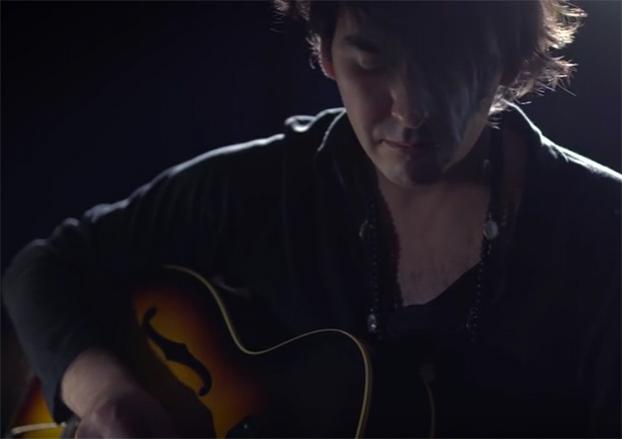Dhani Harrison on Hard Rock Influences, Keeping Up with Vintage Gear

While In///Parallel may be the debut solo album from Dhani Harrison, it's far from his first major recording.
As part of Thenewno2, Harrison has released three full-length studio efforts. In addition, as a member of the supergroup Fistful Of Mercy—alongside Ben Harper, Joseph Arthur and legendary session drummer Jim Keltner—Harrison was part of 2010’s As I Call You Down.
If that wasn't enough, Harrison has also scored numerous television and film projects, and was even a part of the Wu-Tang Clan's 2007 album, 8 Diagrams.
We recently sat down with Harrison to discuss In///Parallel, his extensive gear collection and his earliest influences.
What made you want to play guitar in the first place? Was it a particular album or artist?
Seeing Mark Knopfler in the "Money For Nothing" video, that definitely was one of those things where I was like, "Whoa, that's cool." All those kind of films like Back To The Future, it couldn't be cooler than a skateboarding, guitar-playing kid. It didn't get any cooler than that.
I think seeing Angus Young, dressed like a schoolboy, all these things made me want to play guitar. Eric Clapton, seeing 24 Nights, that tour as well. That was all around the same time as Lethal Weapon, Lethal Weapon 2, all those guitar-y soundtracks. Go and listen to those soundtracks, they had some great guitar in there. Things like that definitely had an impact on me.
Get The Pick Newsletter
All the latest guitar news, interviews, lessons, reviews, deals and more, direct to your inbox!
Did you have a hard rock past? I ask because some of those influences had a hard rock persuasion, which I don't necessarily hear in your music.
I grew up listening to Iron Maiden and Jimi Hendrix. I was a huge Jimi Hendrix fan. Cream and Hendrix later on, but mostly just Hendrix. Everyone in my band grew up listening to Maiden, so it's pretty metal, the band I'm in now actually. I played with them last night on [Jimmy] Kimmel and it's not soft.
I read somewhere that you started off as a drummer. Is that true?
Yeah, like a lot of kids, you just get a little drum kit to bang on. I love playing the drums still. I played the drums on my most recent record and also on some of the Thenewno2 records. I still enjoy drumming, I just don't see myself as a Don Henley-type.
When did piano come into your repertoire?
Yeah, piano on the way from drums to guitar. I didn't keep up my classical as well as I'd have liked to. That's definitely something I encourage. If you're playing piano, it only gets better and you only get better. It takes a lot of practice for that instrument. I just naturally found guitar. I just woke up one day and could play guitar, it's very weird. Piano, I love so much and I play so much, but I'm still so basic.
Does gear play a big role in who you are as a composer?
I definitely started using more tenor guitars, to be honest. I find that there's too many notes in a chord. You don't need that many notes when you're composing. It's kind of easier playing tenor, so I've been playing tenor.
I've got a really nice 1952 Gibson single cutaway tenor with a F-hole. I'm not sure what the model number is, but it has a P94 pickup on it and it just sounds fantastic. It's kind of like if you made a Maccaferri-sounding thing, almost Django [Reinhardt]-esque.
Are you a big collector, in general? Or that's just one of your go-to guitars?
It's something I bought. You know when you find a guitar and it just has loads of music in it? You're like, "This one's coming with me." I actually have a very extensive collection, which I maintain.
It's a big responsibility looking after the guitars I got left. It takes a lot of upkeep. I keep saying if you have a piece of equipment you look after every day, it will last you 100 years, but if you don't look after it, it will last you 10.
In terms of that upkeep, do you have any secrets? Or do you have storage facilities and people who help look after it all?
It's a big combined group effort. A lot of stuff goes into shows. The preservation of my dad's stuff. A lot of the equipment I was left after he passed away, definitely the equipment that I was left is in a better state now than it was then. A lot of stuff hadn't been used since the Seventies and the Eighties.
There's so many things I had reconditioned, especially analog tape stuff, mellotrons and stuff like that really requires upkeep. All of it's up and running ,and everything I've got in my studio now works.
That's a big achievement, to say everything in your studio works. It's not just sitting there because you don't want to get rid of it because it's valuable but it doesn't work. There's no point in having stuff like that. It might as well be in a museum.
“I liked that they were the underdogs. It was not the mainstream guitar. It was something that was hard to find”: Vox guitars deserve a second look – just ask L.A. Witch’s Sade Sanchez, who’s teaming hers with ugly pedals for nouveau garage rock thrills
“I suppose I felt that I deserved it for the amount of seriousness that I’d put into it. My head was huge!” “Clapton is God” graffiti made him a guitar legend when he was barely 20 – he says he was far from uncomfortable with the adulation at the time










